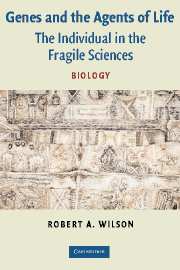Book contents
- Frontmatter
- Contents
- List of Tables and Figures
- Acknowledgments
- PART ONE INDIVIDUALS, AGENCY, AND BIOLOGY
- 1 Individuals and Biology
- 2 Thinking about Biological Agents
- PART TWO SPECIES, ORGANISMS, AND BIOLOGICAL NATURAL KINDS
- PART THREE GENES AND ORGANISMIC DEVELOPMENT
- PART FOUR GROUPS AND NATURAL SELECTION
- Notes
- References
- Index
2 - Thinking about Biological Agents
Published online by Cambridge University Press: 05 June 2012
- Frontmatter
- Contents
- List of Tables and Figures
- Acknowledgments
- PART ONE INDIVIDUALS, AGENCY, AND BIOLOGY
- 1 Individuals and Biology
- 2 Thinking about Biological Agents
- PART TWO SPECIES, ORGANISMS, AND BIOLOGICAL NATURAL KINDS
- PART THREE GENES AND ORGANISMIC DEVELOPMENT
- PART FOUR GROUPS AND NATURAL SELECTION
- Notes
- References
- Index
Summary
TOOLS OF THE TRADE
I have suggested that we think of biology and biological agents in the broader context of the fragile sciences. One reason is that there is a useful conceptual toolkit – of concepts, distinctions, theses, and claims – that can be readily applied to the conception of individuals and agents across the cognitive, biological, and social sciences.
In this chapter, I introduce and illustrate some of the concepts and claims that will play central roles in the substantive discussions of biological agency in the remainder of the book. Most of these are likely to be novel for biologists, and they have not been extensively treated within the philosophy of biology. Their real import for thinking about biological agents lies in the substantive discussions in Parts Two through Four.
What are these tools of the trade? They are: the debate between individualists and externalists within the cognitive and biological sciences; the methodologies that accompany hierarchical thinking in the biological sciences; the notions of taxonomy, realization, and determination; the thesis of smallism as a general metaphysical view guiding research in biology; and, returning to the idea that life and mind are at least sometimes fruitfully considered together, the claim that a cognitive metaphor often operates in the biological and social sciences, particularly in its characterization of biological agents.
- Type
- Chapter
- Information
- Genes and the Agents of LifeThe Individual in the Fragile Sciences Biology, pp. 23 - 44Publisher: Cambridge University PressPrint publication year: 2004



